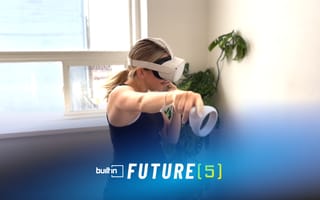
Sure, the latest initiatives from the Teslas, Apples and Googles of the industry tend to dominate the tech news space — and with good reason. Still, the tech titans aren’t the only ones bringing innovation to the sector.
In an effort to highlight up-and-coming startups, Built In is launching The Future 5 across eight major U.S. tech hubs. Each quarter, we will feature five tech startups, nonprofits or entrepreneurs in each of these hubs who just might be working on the next big thing. Read our round-up of rising startups from last quarter here.
* * *
Virtual reality has been around for several years. Since its popularization in the mid-2010s when Meta acquired Oculus, there have been advances to the tech’s hardware and software, making it easier for consumers to gravitate toward and use. Despite the advances, much of virtual reality’s uses remain in the gaming industry, but it is starting to spread into other verticals.
Fitness is one of the many sectors that has not yet been able to adapt to virtual reality, but tech entrepreneur Carter Chavez is helping bring the industry into the modern age with his platform FocusVR.
“I’m working on bringing the actual fitness trainers whose livelihood and knowledge base is all about proper fitness ... into the virtual environment,” Chavez told Built In.
FocusVR is an online marketplace where fitness trainers can host live exercise classes in the metaverse. Class range from strength training, stretching, yoga, meditation, boxing and more and can hold up to 15 participants and one trainer per room. To join a class, participants must use Meta Quest 2 headset to follow along with the trainer.
I’m working on bringing the actual fitness trainers whose livelihood and knowledge base is all about proper fitness ... into the virtual environment.”
Before FocusVR launched in March, Chavez said several fitness VR options on the market were gamified platforms that would have users enter a virtual world and move around with a headset to dodge targets. Chavez’s platform, however, brings fitness courses typically offered at gyms to people’s homes.
The rise of at-home fitness kicked off during the Covid-19 pandemic when brick-and-mortar gyms were forced to temporarily close and people began working out of their homes. To stick to a routine during unsettling times, people often signed up for classes hosted on Zoom or bought Pelotons or other at-home fitness equipment and registered for courses on the respective platforms.
Unlike the Zoom options, Chavez said taking classes through VR is a more social and immersive experience for the user. By using a VR headset, users can see other participants and their avatars while they’re working out, creating a similar experience to going to an in-person class.
“If I have my friends in New York and [we] do a yoga class together on Zoom, it doesn’t feel like we’re actually hanging out in person doing that,” Chavez said. “But with VR, it feels as if we’ve actually spent time together even though we’re in different time zones across the country.”
Before launching FocusVR, Chavez worked at Amazon as an engineer for the Alexa app and Alexa devices. He told Built In that he was inspired to launch FocusVR due to his experience working as a fitness trainer after high school. He wanted to incorporate VR with fitness due to the growing market and his belief that VR will replace much of the tech used today.
Going forward, Chavez wants to continue rolling out the FocusVR marketplace and developing new features. Eventually, he sees FocusVR partnering with gyms that would open up VR training as workout options for members that are already part of a gym.




